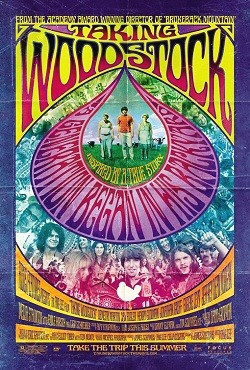
Here’s a good idea: take a watershed moment in contemporary music history and recreate it for the big screen, minus the music! That’ll work, right? Actually yes – it works a treat in Taking Woodstock, an unprepossessing personal/cultural coming of age yarn told from the perspective of, er, event management and directed by the ever-unpredictable genre hopping auteur Ang Lee.
Forget Jefferson Airplane, Janis Joplin, Arlo Guthrie, Joe Cocker, Santana and that hippy dude with the fluid fingers and the trippy headbands and the Purple Haze – what about the rental agreement for the land they used? What about the security arrangements? The struggling family next door? The townspeople living in fear of an imminent hippie invasion? Says one local: “they’ll be high on drugs – robbing us by day and raping the cattle by night!”
In T.W. Ang Lee answers the questions nobody asked and views the milestone peace-love-understanding-and-total-lack-of-hygiene event in the same way most people who attended would probably regard it as: not a world-revolutionising moment but a party big and wild enough to mean something significant in their lives: a fresh perspective, perhaps; a wider outlook; an inspiration for change; some kind of intangible high-water mark underscored by the sensation that whatever transpired on that patch of soiled pastures will surely never come again…
Ang Lee convincingly captures the enormity of organising Woodstock, how it must have impacted the local infrastructure and the strange amorous air the town must have been breathing – but all that is second fiddle along with the music and the party-making to the story of Elliot Teichberg (Demetri Martin), a straight-as-an-arrow dag who bends with the drugs and music en route to forging independence from his parents. He works with ma and pa for the family business, El Monaco motel, a dilapidated hovel where the sheets are dirty – skinflint mom says detergent costs $$$ – and the air conditioning is nothing more than a plastic box on the wall. Similar to the Bill Pullman plotline in this year’s Bottle Shock (also inspired by a true story) El Monaco is in debt and the Teichbergs are failing to make the bank payments. Elliot pleads for another couple of months of credit and then voilà – a miracle presents itself in the form of half a million freaks revving up to par-tay like it was – funnily enough – 1969. The Teichberg family land is swampy and no good for it but down the road, at Eugene Levy’s place – he makes awesome chocolate milk, though the upcoming visitors will be partial to things a little stronger – the grass is crisp and green and fulsome and just beckoning to be trashed.
Lee avoids recreating on stage events, a wise move considering they’re more or less inimitable, though I’d love to see who’d have the gall to impersonate Joe Cocker and how many drugs they’d have to take to warm into the role. Demetri Martin, a fresh-faced actor who looks like Arj Barker crossed with a young Dustin Hoffman, gives a measured and quietly assuming performance perfectly conducive to the film’s unprepossessing atmosphere, which feels believable rather than realistic. Lee finesses the film with small touches and one tracking shot is particularly neat – it follows Elliot on the back of a police motorcycle as they navigate the congested roads: hippies play chess on a car roof; some spoke reefers; one holds up a sign that reads “Bob Dylan please show up.” There is a refreshingly realistic acid-imbibing scene in a van which shirks the common LCD depictions of dragons and trolls and fantasy creatures in favour of swirling colours, shifting patterns and reflections of light and shadow. As any psychotropic-muncher will tell you, this is a vastly more accurate way of illustrating the drug’s effects. The film hits a family-drama slow spot into the second hour, which is especially a downer considering the king hell party unfolding outside the homestead, but it doesn’t last too long.
Crucially, the characters are endearing and the story is thoughtfully handled. Ang Lee dances around the peripheries of history and largely avoids indulging in base level stereotypical perceptions of Woodstock – this time it aint, brothers and sisters, about the music. Placing the event inside the context of a story about a struggling family who are inadvertently thrust into the eye of a cultural hurricane is – against the odds, perhaps – a format that works.
Taking Woodstock’s Australian theatrical release date: August 27, 2009








Crikey is committed to hosting lively discussions. Help us keep the conversation useful, interesting and welcoming. We aim to publish comments quickly in the interest of promoting robust conversation, but we’re a small team and we deploy filters to protect against legal risk. Occasionally your comment may be held up while we review, but we’re working as fast as we can to keep the conversation rolling.
The Crikey comment section is members-only content. Please subscribe to leave a comment.
The Crikey comment section is members-only content. Please login to leave a comment.